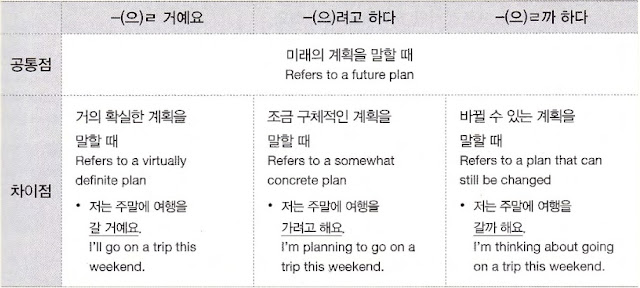 가: 아키라 씨, 주말에 뭐 할 거예요?
가: 아키라 씨, 주말에 뭐 할 거예요?
Akira, what will you do this weekend?
나: 그동안 여유가 없어서 전혀 못 놀았는데 주말에는 컴퓨터게 임을 하면서 좀 놀까 해요.
I haven’t had any time to have any fun lately, so I am thinking of playing some computer games.
가: 저녁에 뭘 먹을 거예요?
What are you going to eat for dinner?
나: 친구들과 같이 삼겹살을 구워 먹을까 해요. 호영 씨도 같이 먹을래요?
I’m planning to have some Korean barbecue (pork) with some friends. Do you want to eat with us, Hoyeong?
This expression is used to indicate the speaker’s vague intention or rough plan that has yet to be finalized and could therefore still change.
 * 다음 달부터 요가를 배울까 해요.
* 다음 달부터 요가를 배울까 해요.
I’m thinking of learning yoga from next month.
* 오랜만에 찜질방에 갈까 하는데 같이 갈래요?
I’m thinking about going to the sauna for the first time in a while, so would you like to go together with me?
* 희사를 옮길까 했는데 월급이 올라서 그냥 다니기로 했어요.
I had been considering changing jobs, but I got a raise, so I decided just to stay here.
1. This expression can only be used with declarative sentences and not with interrogative, imperative, or propositive sentences. It also cannot be used in the future tense.
• 다음 달부터 수영을 할까 해요? ( X )
다음 달부터 수영을 할까 하세요. (X)
다음 달부터 수영을 할까 합시다. (X)
다음 달부터 수영을 할까 할 거예요. (X)
->다음 달부터 수영을 할까 해요. (〇)
2. When using this expression in a negative sentence, either the form 안 -(으)ㄹ까 하다 or -지 말까 하다 can be used. The form 못 -(으)ㄹ까 하다 however, cannot be used.
• 점심에는 학생 식당에서 밥을 못 먹을까 해요. (X )
->점심에는 학생 식당에서 밥을 안 먹을까 해요. (〇)
->점심에는 학생 식당에서 밥을 먹지 말까 해요. (〇)
The expressions -(으)ㄹ 거예요,-(으)려고 하다 and -(으)ㄹ까 하다, all of which indicate a future plan, may appear to be similar, but they actually have the following differences.

>> You can click on the title of each grammar below to learn about the other grammar which also expresses ‘Resolution and Intent’:
01 -(으)ㄹ까 하다
02 -고자
03 -(으)려던 참이다
04 -(으)ㄹ 겸 -(으)ㄹ 겸
05 -아/어야지요
>> Full of Intermediate grammar: Click here
